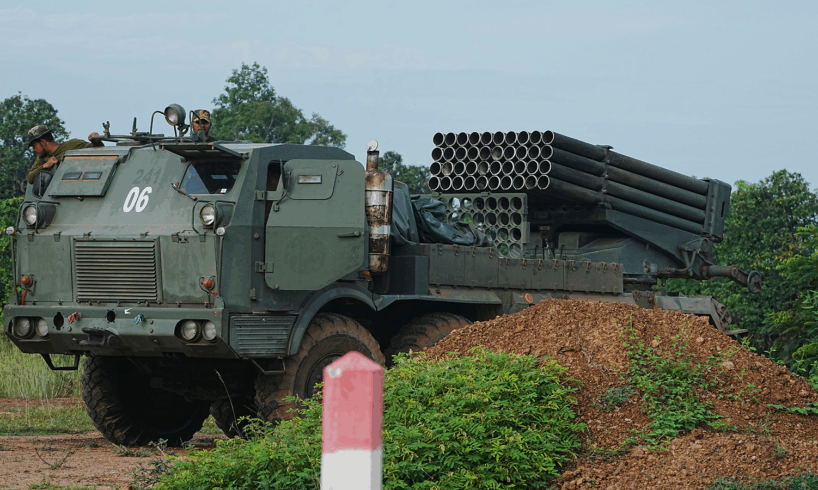
Less than three weeks after US President Trump grandstanded in Malaysia as a “peacemaker” at the signing of a truce between Cambodia and Thailand, the agreement has been suspended, and hostilities have flared again.
Cambodian military vehicle carries rocket launcher in Oddar Meanchey province, Cambodia, July 25, 2025. [AP Photo/Heng Sinith]
Cambodia’s Defence Ministry claimed that Thai soldiers had opened fire near a disputed border village yesterday afternoon, stating that one person had been killed and three wounded. Thailand has disputed the account, saying that Cambodian soldiers had initially fired into Thai territory.
Thai army spokesman Winthai Suvaree said: “Thai forces took cover and fired warning shots in response, following rules of engagement.” He added that the incident lasted about 10 minutes and there were no casualties on the Thai side.
The two countries have repeatedly clashed over their disputed border—the legacy of the colonial domination of South East Asia. Cambodia bases its claims, which Thailand rejects, on a 1907 map drawn by French officials in Indochina to demarcate its colonial possessions from the nominally independent Kingdom of Siam (now Thailand).
Yesterday’s incident took place near a disputed settlement that Thailand claims is part of Ban Nong Ya Kaew village in its Sa Kaeo province. Cambodia says it is part of Prey Chan village in its Banteay Meanchey province. It has been the site of previous clashes.
The peace accord signed on October 26 in Malaysia did nothing to resolve the longstanding border disputes. Rather it simply formalised a ceasefire that followed five days of fierce fighting between Cambodia and Thailand in July involving warplanes, tanks, artillery and rockets. The clashes, which took place along hundreds of kilometres of disputed border, were the most extensive since fighting in 2011.
At least 43 people, including civilians, were killed and hundreds of thousands of civilians on both sides were forced to flee border areas before US, Chinese and Malaysian officials brokered an initial truce. Malaysia was involved as the current chair of the Association of South East Asian Nations (ASEAN).
Thailand announced on Monday that it was suspending implementation of the accord after its soldiers were injured by what it claimed was a newly laid landmine. According to the army, one soldier’s right leg was severed in the blast, while another had shrapnel wounds to his leg.
After visiting the wounded soldiers near the border, Thai Prime Minister Anutin Charnvirakul, who heads a fragile minority government, declared: “Today, we consider that the agreement we had in place to move toward peace has ended.” He added belligerently: “Thailand belongs to us. The ground we are standing on right now is Thailand. No one can claim sovereignty over Thai territory.”
Anutin only came to power in September after the right-wing establishment, based on the military and monarchy, exploited border incidents earlier in the year to oust Prime Minister Paetongtarn Shinawatra over an allegedly deferential phone call to Cambodian strongman Hun Sen. After promising to hold fresh elections by April next year, Anutin is clearly planning to campaign on the basis of whipping up nationalist sentiment over the border dispute.
Aspects of the October accord have started to be implemented, including the withdrawal of heavy weaponry, but the deployment of observers drawn from ASEAN countries along the border has barely started. Thailand still holds 18 Cambodian soldiers captured in the July fighting whose release was a key aspect of the accord.
In a statement on Tuesday, the Cambodian government categorically denied Thai allegations that it had laid new landmines in disputed border areas. It said that many landmines stemming from Cambodia’s civil war in the 1970s and 1980s had not been cleared “due to the difficult terrains and the un-demarcated status of the border areas.”
While the heightened tensions may ease, temporarily at least, this week’s events highlight the fragile and limited character of the truce signed last month. The governments in both countries are exploiting reactionary nationalism and patriotism to strengthen their position amid slowing growth and rising social stresses.
The World Bank forecasts GDP growth this year of 4 percent for Cambodia and just 1.8 percent for Thailand—figures that are down from last year, and well below those of the decade of the 2010s. Both economies rely heavily on exports, including to the US, and have been hit by Trump’s large tariff increases.
Trump’s threat to impose huge tariffs on both countries in July was one factor that induced them to agree to a ceasefire. While not as high as threatened, Trump reached agreements with Thailand and Cambodia last month in Malaysia that imposed a 19 percent tariff across the board. The high impost will weaken their economies.
The events of this week only further expose the absurdity of Trump’s posturing as a peacemaker. The White House statement last month declared that the Peace Accord was “a historic peace declaration ending border tensions between Thailand and Cambodia,” adding that “this is a landmark achievement for international diplomacy that only President Trump could accomplish.”
Trump himself bragged on social media that “most importantly, signed the Peace Treaty between Thailand and Cambodia. NO WAR! Now, off to Japan!!!”
Trump and the White House are yet to make any statement in response to Thailand’s suspension of the “historic peace declaration” or yesterday’s clash. That is not surprising. Trump has no more concern for the victims of the Thai-Cambodian conflict than for the tens of thousands of Palestinians killed, and still being killed, despite the so-called truce brokered in Gaza.
Trump’s trip to Asia was never about peace, but rather was part of his administration’s intensifying preparations for war against China, which US imperialism regards as the chief threat to its global domination.
The World Socialist Web Site is the voice of the working class and the leadership of the international socialist movement. We rely entirely on the support of our readers. Please donate today!





